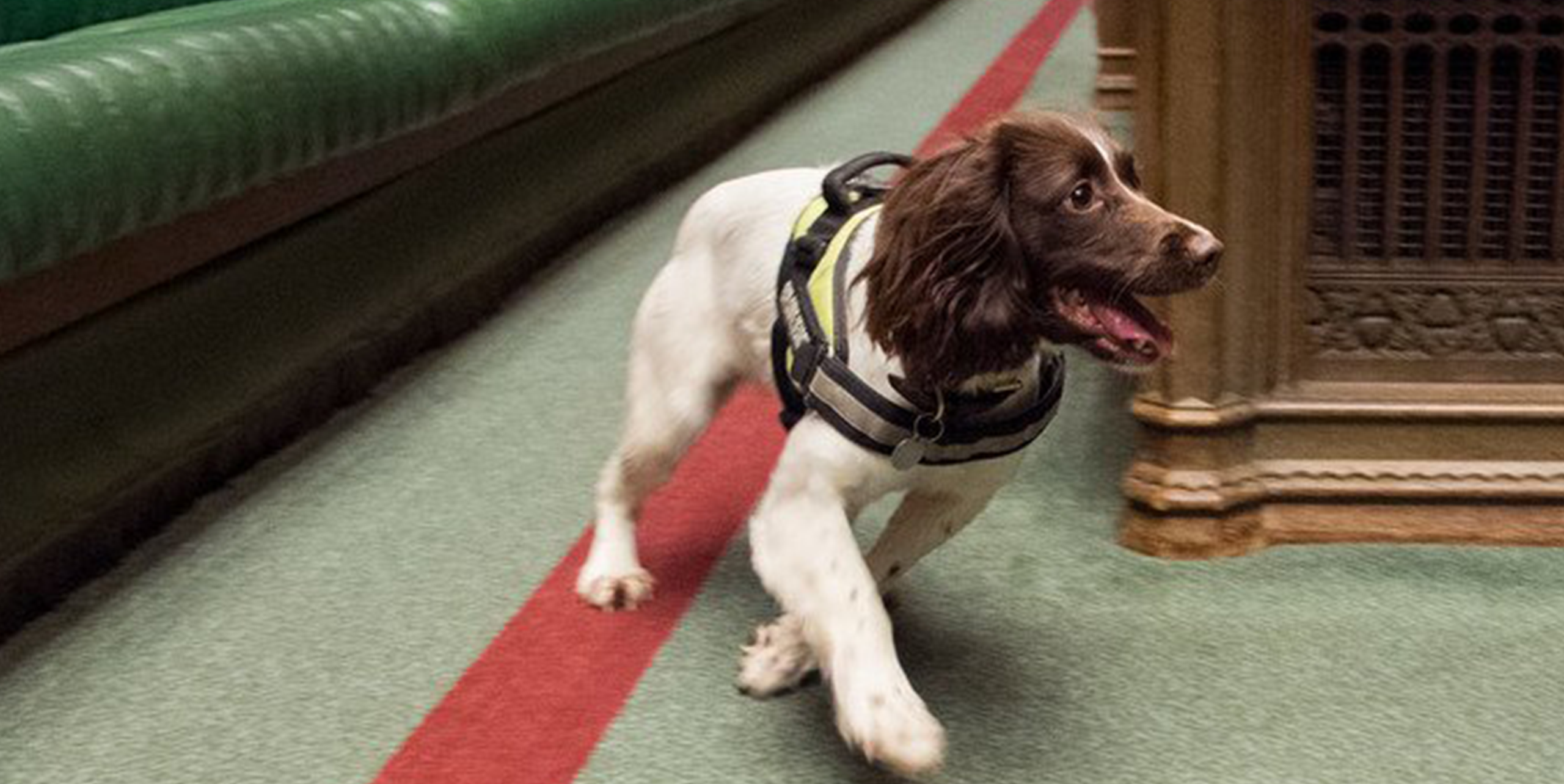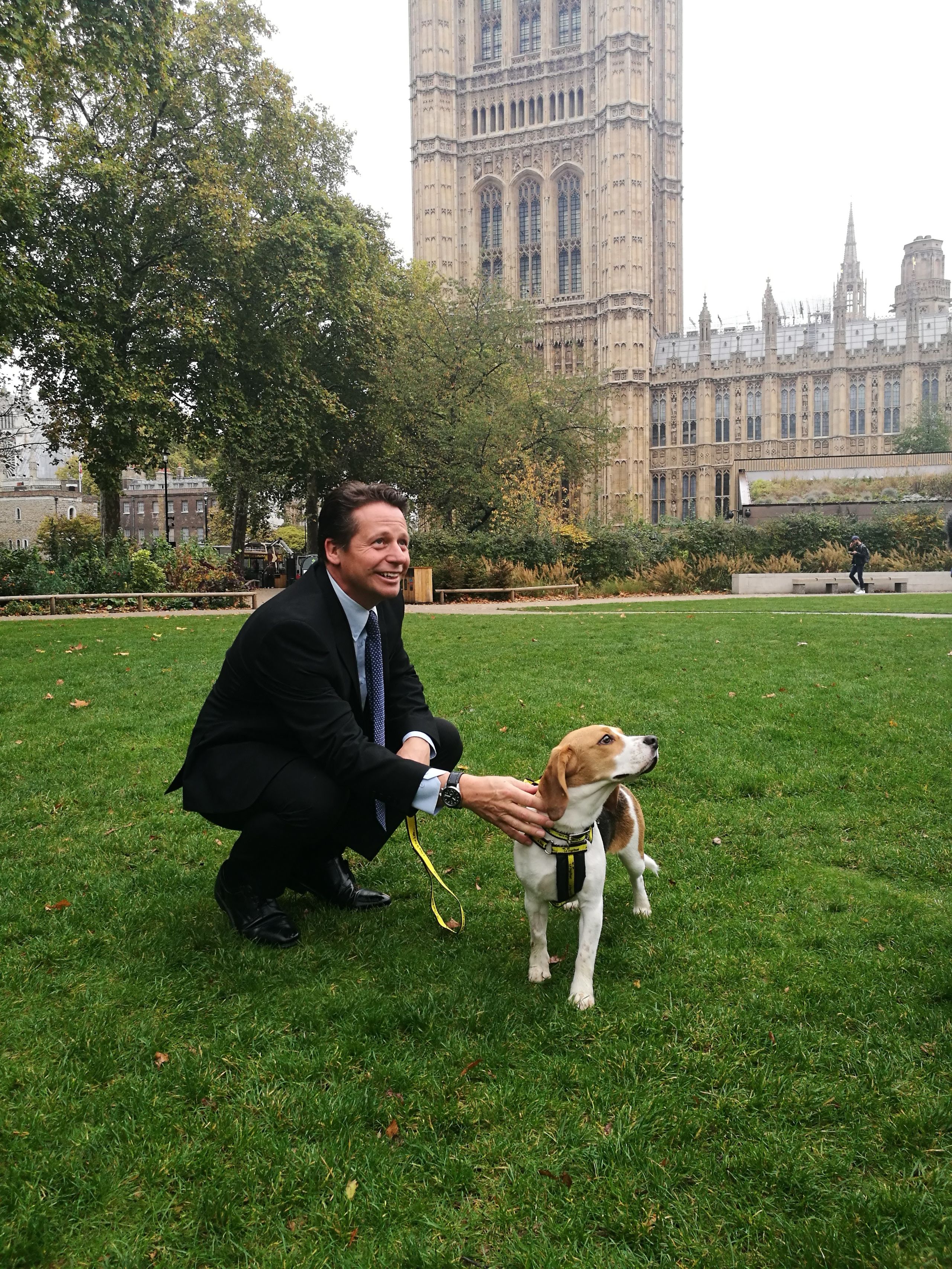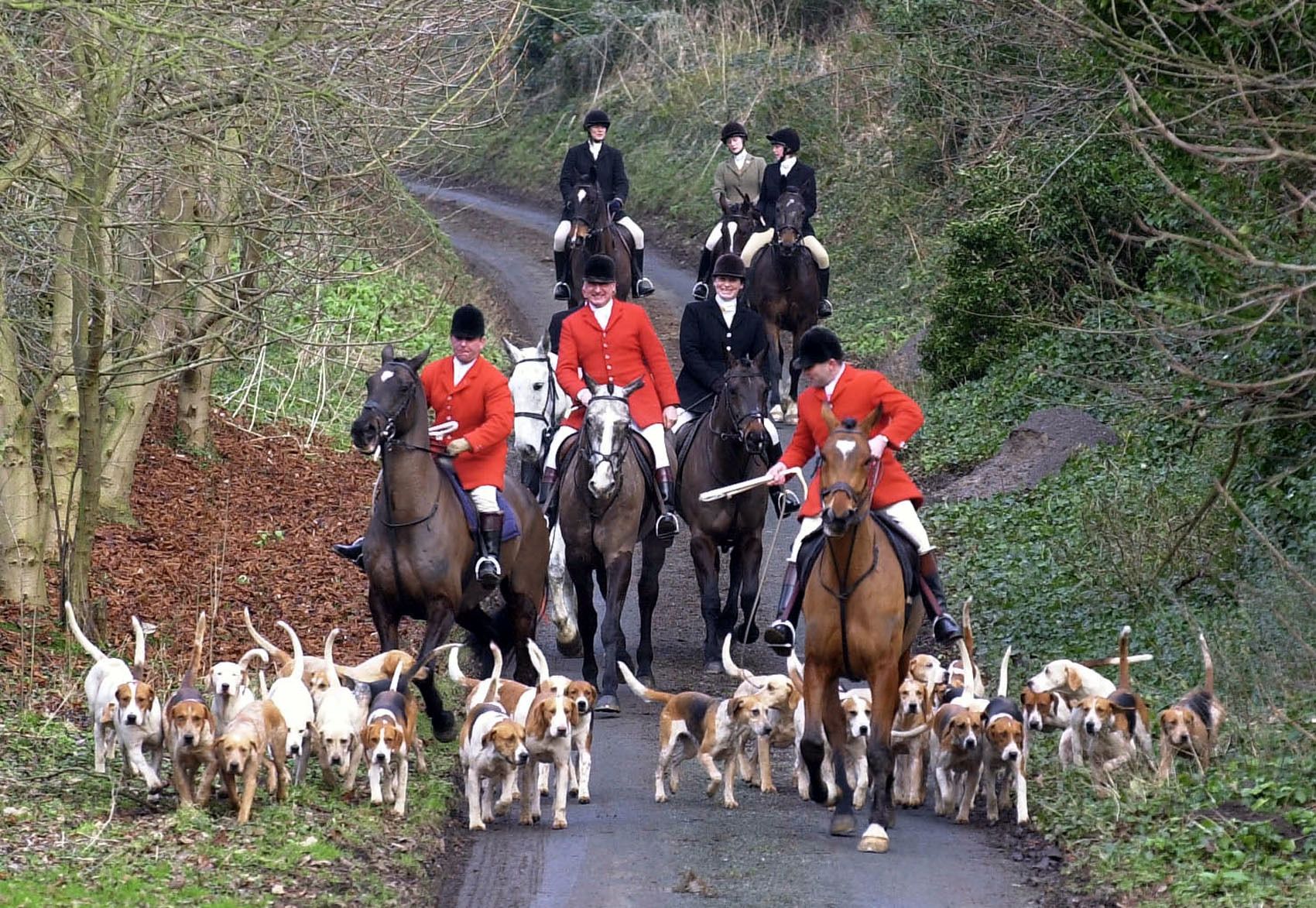Animal Welfare in the House of Commons - 2019
Debates and legislation so far this year

2019 has been a very busy year so far in the House of Commons. While attention has been focused on Brexit, a range of animal welfare debates and legislation have been progressing in the background.
Several MPs have been working alongside charities and external campaigns to seek answers from the Government on issues like:
- dog welfare
- fox hunting
- horse welfare
In case you've missed anything, we've pulled together some of the main stories on the subject, and summarised below with links to;
- Hansard: where you can read the official written transcript of Parliamentary debates and proceedings;
- Parliamentlive.tv: where you can watch the debates;
- Parliament.uk's glossary: definitions explaining how Parliament works;
- House of Commons Library briefings: impartial expert summaries and research on the relevant issues or debate topics.
Dog welfare
So far in 2019, there have been several debates and a law passed relating to dog welfare:
Finn's Law received Royal Assent and became an Act of Parliament in April.
Dog meat consumption was discussed twice in February, with both Bill Wiggin MP and Jim Shannon MP holding debates and proposing new legislation.
Nigel Huddleston MP also held a debate about puppy smuggling in April.

Finn's Law
Finn is a police dog from Hertfordshire, who was seriously injured in 2016 while preventing a robbery. A petition to change the law received 127k signatures, and shortly afterwards, Sir Oliver Heald MP introduced a Private Member's Bill known as Finn's Law, which makes it a specific offence to cause unnecessary suffering to a service animal. It received Royal Assent - the Queen's formal approval for a new law - in April, and is now an Act of Parliament.
Sir Oliver Heald gives some background on why he sponsored the Bill:
"Service animals such as Finn do a great job, and there are 1,200 police dogs in service at any time. There should be proper recognition in law of their vital role, and I commend the Bill to the House. "
Read our news story about Finn's Law on parliament.uk
Private Member's Bills are a mechanism by which MPs who are not ministers can introduce legislation to Parliament. Glossary: Private Member's Bills
Ten minute rule motion: Dog Meat (Consumption) (Offences) Bill 2017-19
19 February - Bill Wiggin MP
In order to reduce the international trade in dog meat, Bill Wiggin MP wants to set a standard by banning its consumption in the UK.
Find out more about the consumption of dog meat in the UK with this Commons Library debate pack.
Did you know that it is legal to eat dog meat in the UK?
— UK House of Commons (@HouseofCommons) February 19, 2019
Bill Wiggin MP wants to change this. Watch him make the case for his Bill, which would make it an offence to consume dog meat: https://t.co/Uy34ua8uu3 pic.twitter.com/G2Ta22BAqa
- Watch Bill Wiggins' speech in the Chamber.
- Follow the progress of the Dog Meat (Consumption) (Offences) Bill 2017-19 on Parliament's bills and legislation page.
A ten minute rule motion is one way of introducing a Private Member's Bill. It allows the MP to make the case for their proposed bill in a speech lasting up to ten minutes in the Chamber. Glossary: ten minute rule motions.
Westminster Hall debate: Dog meat in the UK
21 February - Jim Shannon MP
Following this, Jim Shannon MP led a Westminster Hall debate to build momentum on the issue, and press the Government for a response.
"30 million dogs are slaughtered for their meat every year".@JimShannonMP is in #WestminsterHall pressing for a ban on the human consumption of dog meat in the UK.
— UK House of Commons (@HouseofCommons) February 21, 2019
Watch: https://t.co/071e8TCyc3 #animalwelfare pic.twitter.com/K82YXnHWtT
David Rutley, The Parliamentary Under-Secretary of State for Environment, Food and Rural Affairs responded on behalf of the Government, stating:
"In this country, it is an offence to cause any unnecessary suffering to an animal or to fail to provide for an animal’s welfare. The maximum penalty for both offences is six months’ imprisonment and/or an unlimited fine. The Government have already announced that they will go further and increase the maximum custodial penalty for animal cruelty to five years."
- Read the Hansard transcript
- Watch the full debate
Westminster Hall is the House of Commons' secondary debating Chamber. MPs can raise a range of issues for debate every Tuesday and Wednesday. A minister must be present to respond to the debate and set out the government's response. Glossary: Westminster Hall debates.
Puppy smuggling
5 April - Nigel Huddleston MP
Following a campaign by the Dogs Trust, Nigel Huddleston MP led a Westminster Hall debate on puppy smuggling.
He sought answers from the Government on increasing penalties, improving border controls and raising public awareness of the issue.
Several other MPs from across the parties currently support the campaign, many of whom attended the debate and made contributions.
The House of Commons Library produced a debate pack on puppy smuggling. Read it here for information on the law as it stands, background information and more.

This week, @HuddlestonNigel led a #WestminsterHall debate backed by @DogsTrust to press the Government for action on #PuppySmuggling.
— UK House of Commons (@HouseofCommons) April 5, 2019
🕮 @commonslibrary briefing: https://t.co/BtRKYBgRHT
🎞Debate video: https://t.co/rme7A3bhtG
📗#Hansard transcript: https://t.co/KjIhge4jyy pic.twitter.com/CN4FvocbRA
Government response:
DEFRA Minister David Rutley described recent developments and committed to enacting new legislation to tackle the issue:
"We have increased resources at major UK ports by one third since 2017, specifically to detect smuggled puppies [...] Last year, we also launched our new dog importation intelligence steering group. It consists of national enforcement agencies such as HMRC, Border Force, the police and the Royal Society for the Prevention of Cruelty to Animals, who are forming a collaborative partnership with the Animal and Plant Health Agency to disrupt puppy smuggling."
"Many honourable Members have talked about the need to increase 10-fold the maximum sentence for animal cruelty, from six months to five years. We are absolutely committed to that, and I am very keen to bring that to the House [...] We will push it through."
Hansard transcript.

Fox hunting
Several MPs this year have argued in favour of tightening the laws on fox hunting during debates and oral ministerial questions.
20 March - Christian Matheson
Ahead of a Westminster Hall debate, members of the public submitted over 3.5k contributions to a Facebook discussion card on Wildlife Crime.
Christian Matheson MP led the debate and used the comments to inform his speech.

"Nowhere is the need for tougher laws more apparent than in the case of foxhunting. Local monitors have witnessed at least six foxes being killed by hunts in my own county of Cheshire this season. There were at least 10 additional reports of foxes being chased in the county and multiple reports of badger setts being blocked in the vicinity of hunts in Cheshire."
- Read the full transcript of the debate on Hansard
- Watch it on parliamentlive.tv.
- What is the law at the moment? How is it enforced? The House of Commons Library briefing has context, policy and background information.
Questions on fox hunting in the Chamber
Fox Hunting has also been raised in questions to various departments, and remains under close scrutiny:
Business of the House: 10 January
Justin Madders MP (Hansard transcript)
Oral questions to DEFRA: 17 January
Christian Matheson MP (Hansard transcript)
Question 8: How many reports he has received of foxes being killed by hunts in England in 2018?
Topical Questions to DEFRA
T.7: Laura Smith MP (Hansard transcript)
Questions to the Attorney General: 31 January
Justin Madders MP (Hansard transcript)
Question 6: What assessment he has made of the effectiveness of the CPS in prosecuting offences under the Hunting Act 2004?
Oral questions normally happen at the beginning of each sitting day from Monday - Thursday. They give MPs the chance to raise issues with government ministers in charge of a specific government department.
Unlike Oral questions, Topical questions do not have to be submitted in advance. The last 15 minutes of most ministerial question sessions is often allocated to Topical questions.
Glossary: Oral questions; Topical questions
Horse welfare
On 20 February, Luke Hall MP led an adjournment debate on horse tethering. Backed by HorseWorld's #BreakTheChain campaign, he asked the Government for action and clarification on the laws around tethering horses.
Did you know that there are currently no specific laws on tethering horses?
— UK House of Commons (@HouseofCommons) February 20, 2019
It's argued that the practice causes the animals physical and emotional distress. @LukeHall is leading a debate on the need for regulation in this area of #animalwelfare. Watch: https://t.co/0NTBwS3zG6 pic.twitter.com/lyiyPeh5g7
The DEFRA Minister David Rutley put forward the Government's position, saying:
"The strong arguments made today and the concerns that have been raised mean that I shall call for a meeting with key stakeholders in the months ahead to see what more can be done in sharing and documenting best practice on horse tethering and ensuring that messages on best practice are more actively disseminated to horse owners. I look forward to working with [Luke Hall MP] on these matters in the months ahead and I am sure that that will help us to deliver animal welfare at a continued high standard now and in the years ahead."
Stay connected or get in touch...
Follow @HouseofCommons on Twitter
or @UKHouseofCommons on Facebook
If you'd like to contact your MP about an issue that's important to you
use our Find Your MP tool to get in touch.

